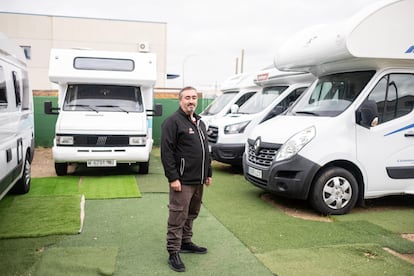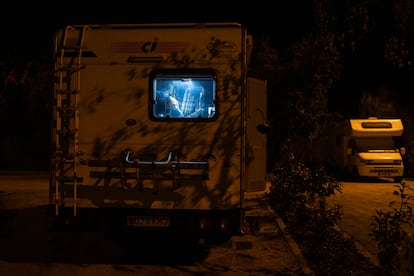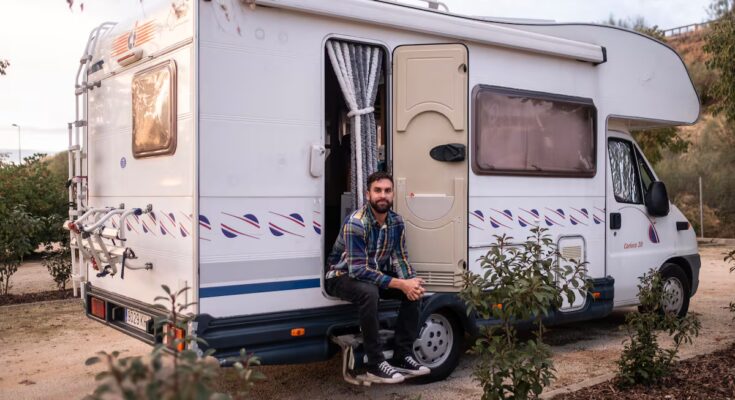Last night the taxi driver got the wrong impression. In the middle of one of these gigantic and lonely avenues, the prototype of a new residential area on the outskirts of Madrid, Antonio asked his driver to stop the car in front of a large supermarket. The man, before paying the ticket, stuck his head out the window and tried to reach the top floor of an adjacent modern 10-storey building with his gaze. “Houses here must cost a lot, right?” he asked, impressed. Antonio shrugged and laughed to himself. The taxi left and Antonio avoided the building where only 20 square meter studio apartments are available for 210,000 euros – in this neighborhood north of the city, a two-room apartment already costs almost 600,000 euros – and headed towards a discreet sandy car park surrounded by greenery where Antonio has his house, the cheapest in this enclave and probably in the entire city: a 2003 Fial Ducato Carioca camper which he bought in 2019 second hand for 22,000 euros. There, like every night, he slept soundly again.
Antonio Doménech, 37 years old, was born in Alcoy (Alicante). He has been a state official in a public school since in the last 2024 opposition notice for primary education teacher in the Community of Madrid he obtained, after several previous attempts, a permanent position, although still “in condition of provisional destination”, that is, “without school for life”. No one in the educational center – which has more than 1,000 children – knows that he lives in a camper even if he parks just over a kilometer from his workplace, where he arrives in the morning on his electric scooter as if he had just left one of these gigantic condominiums. “I don’t care if it is known, but I won’t be the one to say it. If they find out it’s because they find out,” says Antonio, who for security reasons prefers not to give the name of the neighborhood in question.
Antonio’s decision to move into a camper was born from a “mathematical reflection”. Tired of sharing apartments in Madrid where he spent most of his time in a single five-square-meter room, Antonio decided that if he could live in that tiny space, “why not in a camper of the same size?” In 2019, when he worked as a gym instructor, rent ate up much of his salary. “Also, I had to spend almost four hours a day going to and from work and studies. Being in Madrid allowed me nothing more than to live to work,” he recalls. Through YouTube videos, like the ones he uploads to the platform today, he was inspired to take the step. “It was the only viable option I found to gain independence. For me it was a perfect plan, but I knew it would have criticism,” he says. To convince his parents, for example, he prepared a computer presentation where he detailed the details with images and economic calculations.
After visiting numerous apartments in the center of Madrid, from Plaza de España to Aluche or Torre Arias, Antonio purchased the Dromolola – that’s what he called his camper. The first night was January 3, 2020 in a parking lot in Campo de las Unidas. Since then the formula has always been the same, living next to your workplace “to make your life easier”. “I got used to it quickly. Even though I’m not one to idealize this life, because it has advantages but also many disadvantages. I don’t sell that this is the ideal home because it isn’t. But for me, in this period of my life, it was a success”, he confesses.
Antonio obtained his master’s exams by studying in this room where almost every object is foldable and hides a double use. Once he was placed on the interim teaching list, he found that the camper gave him a great advantage over other teachers. “The first thing they always offer are places in cities where Christ lost his lighter,” he explains. “For someone from Alcorcón or Fuenlabrada, going to Velilla de San Antonio or La Cabrera is impossible. That’s why people always refuse them. It can take almost two hours to get there, due to morning traffic or transport. For me it was very simple, I could park in front of the school door and live there,” he continues. Thus, by taking what others rejected, Antonio added points and advanced up the opposition list at a much greater speed.
Even if after six years, and having obtained a stable job worth around 1,900 euros a month, he could already aspire to a mortgage or to take out a rental, the accounts, just like in 2019, still don’t add up. “I live in a camper right now because I want to, not out of necessity. Although obviously if house prices were different, I would move into a house, which is my future plan. What happens is that after this satisfying camper experience I have become more demanding and what I’m not willing to do is drown myself like I did for ten years,” he comments. “If I had discovered it at 25 I wouldn’t have wasted thousands of euros on renting rooms and maybe I could have moved into a house,” declares Antonio, whose monthly expenses do not reach 100 euros a month. For electricity, two solar panels and two lithium batteries are sufficient. Three hours a day in the sun is enough. The heating runs on propane gas and water is available at petrol stations where refilling the 100 liter tank is free. Get Internet via unlimited data cards. Working from Monday to Friday with fixed hours, he barely spends on petrol on weekends. Antonio confirms his decision and warns: “There are many more people like me. Not only in Palma, but also in Madrid. People who find in the camper a combination of something economical and freedom. People who do not want and cannot go through the circle of madness that we suffer with accommodation in Madrid. Other cases have come to me, for example, in Moratalaz, in Alcalá de Henares, in the Sierra or in Fuenlabrada”, he underlines. A few kilometers from your parking lot, for example, near the Hortaleza metro station, there are several people living in caravans and cars camouflaged with other vehicles.
In Spain, the number of camper owners has multiplied in the last decade. While 2,491 campers and motorhomes were registered in 2015, in 2024 there were 6,459, according to data provided by ASEICAR, the Spanish Association of the Caravanning Industry and Trade. Last year, the Community of Madrid had the third highest number of registrations, after Catalonia and Andalusia, which attract most of the caravaning movement because they have a coast. ASEICAR defends the camper as a form of leisure, “not as accommodation”, and insists on denouncing that “the camper cannot be the solution to the lack of apartments in tourist areas” in reference to the problems of Palma de Mallorca. Current legislation allows campers to be parked on public roads and to stay overnight. What is prohibited is “camping”, that is, removing protruding elements such as awnings, ladders or tables and chairs.

“The reality is that the housing problem represents the last push for our sector”, says José Talaván, 53 years old, an employee of the Camper Van Madrid company which is dedicated to buying and selling campers in Humanes. “We sell between five and eight a month. Previously the average was one or two. Most of the customers want me to leave the rent and live here. Last week a woman came with her dogs and this morning she called a boy. In Madrid it is not yet a phenomenon of thousands of people but you can find several cases”, explains Talaván. “Spain is 10 years behind France, where the camper is something cultural,” he underlines.
In the heat of a vegetable soup warming up in the kitchen at the back of the house. DromololaAntonio confesses that he hasn’t forgotten to look for a house. Continue to use applications like Idealista frequently, now only for shopping. He was recently visiting and wanted to stay in a 37 square meter studio apartment in the Courthouse which initially cost €215,000. “Three hours after seeing it, they called me to tell me they had just sold it for 240,000 to a Spaniard who wanted it as an investment,” he recalls.

Do you have something to say? Write to the author at dexposito@elpais.es



